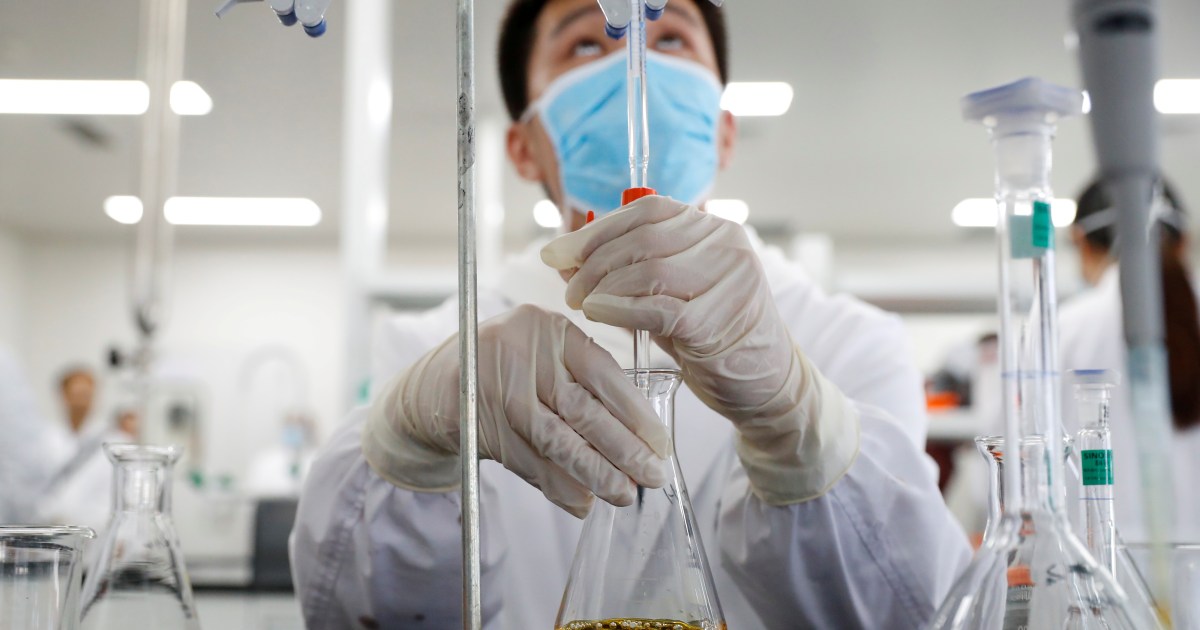Early trial results show Sinovac vaccine triggers immune response | China
Sinovac Biotech’s experimental COVID-19 vaccine CoronaVac triggered a quick immune response but the level of antibodies produced was lower than in people who had recovered from the disease, early trial results showed on Wednesday.
While the early to mid-stage trials were not designed to assess the efficacy of CoronaVac, researchers said it could provide sufficient protection, based on their experience with other vaccines and data from preclinical studies with macaques.
The study follows encouraging announcements this month from US drugmakers Pfizer and Moderna, as well as Russia’s Sputnik V, that their experimental vaccines were more than 90 percent effective based on interim data from large, late-stage trials.
CoronaVac and four other experimental vaccines developed in China are currently undergoing late-stage trials to determine their effectiveness in preventing COVID-19.
The Sinovac findings, published in a peer-reviewed paper in the medical journal The Lancet Infectious Diseases, came from results in Phase I and Phase II clinical trials in China involving more than 700 participants.
“Our findings show that CoronaVac is capable of inducing a quick antibody response within four weeks of immunisation by giving two doses of the vaccine at a 14-day interval,” said Zhu Fengcai of the Jiangsu Provincial Center for Disease Control and Prevention in Nanjing and one of the authors of the paper.
 CoronaVac is one of three experimental COVID-19 vaccines China has been using to inoculate hundreds of thousands of people under its emergency use programme [File: Thomas Peter/Reuters]
CoronaVac is one of three experimental COVID-19 vaccines China has been using to inoculate hundreds of thousands of people under its emergency use programme [File: Thomas Peter/Reuters]“We believe that this makes the vaccine suitable for emergency use during the pandemic,” Zhu said in a statement published alongside the paper.
Among the Phase II trials limitations, the researchers noted that only healthy adults were involved and that the study did not include individuals from groups known to be more susceptible to COVID-19 including people of 60 years of age or more, or with other underlying diseases.
It also did not assess T-cell responses, which they said would form part of the Phase III trials in Brazil. Phase III trials are also under way in Indonesia and Brazil, which has reported the most coronavirus cases in the world after the United States and India.
Findings from those large, late-stage studies would be crucial to determine if the immune response generated by CoronaVac was sufficient to protect people from the coronavirus infection, the scientists said.
Naor Bar-Zeev from Johns Hopkins University, who was not involved in the study, said the results must be interpreted with caution until Phase III results are published.
“But even then, after Phase III trial completion and after licensure, we should prudently remain cautious,” he said.
‘Attractive option’
CoronaVac is one of three experimental COVID-19 vaccines China has been using to inoculate hundreds of thousands of people under its emergency use programme.
The two other vaccines in China’s emergency programme, both developed by institutes linked to Sinopharm, and another vaccine from CanSino Biologics, were also shown to be safe and triggered immune responses in early and mid-stage trials, according to peer-reviewed papers.
Gang Zeng, a Sinovac researcher involved in the CoronaVac study, said the vaccine could be an attractive option because it can be stored at normal fridge temperatures of between 2 and 8 degrees Celsius (36°- 46°F) and may remain stable for up to three years.
“(It) would offer some advantages for distribution to regions where access to refrigeration is challenging,” Gang said.
 Sinovac is running late stage, large-scale trials of its experimental vaccines in Brazil, Indonesia and Turkey [File: Diego Vara/Reuters]
Sinovac is running late stage, large-scale trials of its experimental vaccines in Brazil, Indonesia and Turkey [File: Diego Vara/Reuters]By contrast, vaccines developed by Pfizer/BioNTech and Moderna use a new technology called synthetic messenger RNA (mRNA) to activate the immune system against the virus and require far colder storage.
Pfizer’s vaccine must be stored and transported at -70C though it can be kept in a normal fridge for up to five days, or up to 15 days in a thermal shipping box. Moderna’s candidate is expected to be stable at normal fridge temperatures for 30 days but for storage of up to six months it needs to be kept at -20C.
CoronaVac is also being considered by Brazil and Indonesia for inoculations in the coming months.
Indonesia has sought emergency authorisation to start a mass vaccination campaign by the end of the year and vaccines produced by Sinovac and China’s Sinopharm are slated to be used in the early stages of the campaign.
Brazil’s Sao Paulo is set to begin importing the first of 46 million doses of China’s Sinovac vaccine against COVID-19 this week and plans to roll out CoronaVac as early as January.

